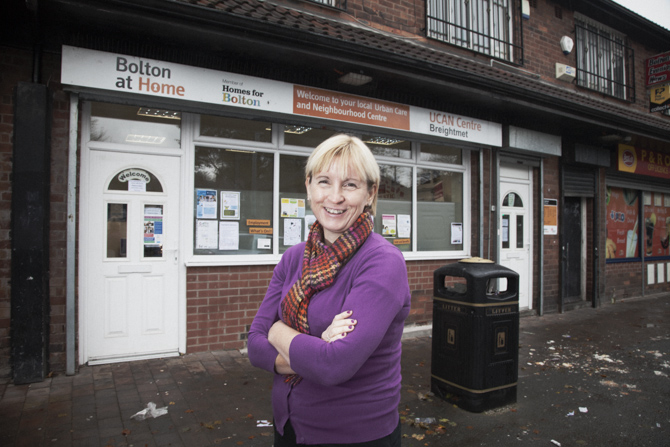“It’s just too simple”
It’s raining again. I swear I’ve only seen Breightmet once in the sunshine since I’ve been embedded in this UCAN two months ago.
I might only be here one day a week but I’m definitely getting the feel for what they are about. There’s half a page of bullet points in my notebook and, before she gets sidetracked with someone else, I ask Vanessa if I can confirm my observations with her. We sit upstairs in her office.
“There’s a lot of ‘drawing people in’, isn’t there? You know, offering things that just get people through the door, like the knitting and the football?”
“… and the IT. They are what we call our engagement tools,” says Vanessa. “We don’t force things down people’s throats. It’s not a compulsory service, people can come in and ask for whatever they need and we will try to help. That leads to conversations and, because we’re right here, we have the space and time to build relationships and trust.”
“Sorry. Why is the IT an engagement tool?”
“At most community venues you have to book a slot on the computers and use them for a specific purpose. Here, we wouldn’t have a problem with customers initially coming in just to use Facebook for example.”
“Just to get them through the door… so you can start those conversations?”
“Exactly. We are the hook.”
“And then, once you get to know them, you find out what issues they have and direct them to different services. It’s sounds simple.”
Vanessa laughs. A sort of it-might-sound-simple-but-it’s-really-quite-challenging kind of laugh.
“And because you’re not a compulsory service,” I continue, “it means you can be very fluid, very adaptable to what people need.”
I’m hitting the nail on the head. Vanessa talks about the flexibility they have with the limited space available. They can invite different services – like the credit union or the employment support advisors – to deliver their services from the UCAN, and the symbiotic relationship ticks boxes for them all.
“So, if the UCAN is so great, why is it not replicated around the country?” I ask.
“That is such a good question, such a fantastic question,” – I try my hardest not to beam – “I think it’s because it’s just too simple.”
“Too simple?”
“Some organisations have these multi-million pound showbiz buildings with ‘meeters and greeters’ behind reception desks – all very posh and clinical – which are about giving the customer a sophisticated experience of a venue rather than offering them what they need. I’m not saying we’re not sophisticated because the UCAN model is very sophisticated but it’s also very simple.”
“Do you think some organisations can’t see the wood for the trees?”
“Some have become very compartmentalised. You have to go to that enquiry desk to do one thing; ring that person to do another or go online to do a third. Some think it’s easier – more cost effective even – to manage customers from a distance. Everyone has a specific role to play, it’s almost like a department store model.
“Here we are the constant hook, we can help people ourselves or refer them to services inside or outside of the UCAN. You really need to see this place to understand how it works in practice. And we have to remember that despite all the new technology there are still a lot of customers out there that need a specific level of meaningful support that can only come from personal, human contact.”
Vanessa is off on one now. And quite rightly. She’s evangelical about the support the UCAN provides and sees it as a model that can work elsewhere. As well as everything else, she’ll be giving guided tours soon.
“By having those conversations we’re empowering customers to – at some point – take control of their own solutions by giving them options in a very informal, non-judgmental way.”

